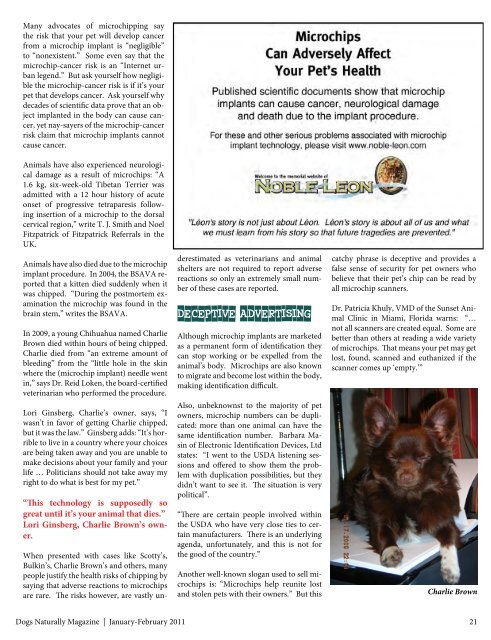January/February 2011 - Dogs Naturally Magazine
January/February 2011 - Dogs Naturally Magazine
January/February 2011 - Dogs Naturally Magazine
You also want an ePaper? Increase the reach of your titles
YUMPU automatically turns print PDFs into web optimized ePapers that Google loves.
Many advocates of microchipping say<br />
the risk that your pet will develop cancer<br />
from a microchip implant is “negligible”<br />
to “nonexistent.” Some even say that the<br />
microchip-cancer risk is an “Internet urban<br />
legend.” But ask yourself how negligible<br />
the microchip-cancer risk is if it’s your<br />
pet that develops cancer. Ask yourself why<br />
decades of scientific data prove that an object<br />
implanted in the body can cause cancer,<br />
yet nay-sayers of the microchip-cancer<br />
risk claim that microchip implants cannot<br />
cause cancer.<br />
Animals have also experienced neurological<br />
damage as a result of microchips: “A<br />
1.6 kg, six-week-old Tibetan Terrier was<br />
admitted with a 12 hour history of acute<br />
onset of progressive tetraparesis following<br />
insertion of a microchip to the dorsal<br />
cervical region,” write T. J. Smith and Noel<br />
Fitzpatrick of Fitzpatrick Referrals in the<br />
UK.<br />
Animals have also died due to the microchip<br />
implant procedure. In 2004, the BSAVA reported<br />
that a kitten died suddenly when it<br />
was chipped. “During the postmortem examination<br />
the microchip was found in the<br />
brain stem,” writes the BSAVA.<br />
In 2009, a young Chihuahua named Charlie<br />
Brown died within hours of being chipped.<br />
Charlie died from “an extreme amount of<br />
bleeding” from the “little hole in the skin<br />
where the (microchip implant) needle went<br />
in,” says Dr. Reid Loken, the board-certified<br />
veterinarian who performed the procedure.<br />
Lori Ginsberg, Charlie’s owner, says, “I<br />
wasn’t in favor of getting Charlie chipped,<br />
but it was the law.” Ginsberg adds: “It’s horrible<br />
to live in a country where your choices<br />
are being taken away and you are unable to<br />
make decisions about your family and your<br />
life … Politicians should not take away my<br />
right to do what is best for my pet.”<br />
“This technology is supposedly so<br />
great until it’s your animal that dies.”<br />
Lori Ginsberg, Charlie Brown’s owner.<br />
When presented with cases like Scotty’s,<br />
Bulkin’s, Charlie Brown’s and others, many<br />
people justify the health risks of chipping by<br />
saying that adverse reactions to microchips<br />
are rare. The risks however, are vastly un-<br />
derestimated as veterinarians and animal<br />
shelters are not required to report adverse<br />
reactions so only an extremely small number<br />
of these cases are reported.<br />
DECEPTIVE ADVERTISING<br />
Although microchip implants are marketed<br />
as a permanent form of identification they<br />
can stop working or be expelled from the<br />
animal’s body. Microchips are also known<br />
to migrate and become lost within the body,<br />
making identification difficult.<br />
Also, unbeknownst to the majority of pet<br />
owners, microchip numbers can be duplicated:<br />
more than one animal can have the<br />
same identification number. Barbara Masin<br />
of Electronic Identification Devices, Ltd<br />
states: “I went to the USDA listening sessions<br />
and offered to show them the problem<br />
with duplication possibilities, but they<br />
didn’t want to see it. The situation is very<br />
political”.<br />
“There are certain people involved within<br />
the USDA who have very close ties to certain<br />
manufacturers. There is an underlying<br />
agenda, unfortunately, and this is not for<br />
the good of the country.”<br />
Another well-known slogan used to sell microchips<br />
is: “Microchips help reunite lost<br />
and stolen pets with their owners.” But this<br />
catchy phrase is deceptive and provides a<br />
false sense of security for pet owners who<br />
believe that their pet’s chip can be read by<br />
all microchip scanners.<br />
Dr. Patricia Khuly, VMD of the Sunset Animal<br />
Clinic in Miami, Florida warns: “…<br />
not all scanners are created equal. Some are<br />
better than others at reading a wide variety<br />
of microchips. That means your pet may get<br />
lost, found, scanned and euthanized if the<br />
scanner comes up ‘empty.’”<br />
Charlie Brown<br />
<strong>Dogs</strong> <strong>Naturally</strong> <strong>Magazine</strong> | <strong>January</strong>-<strong>February</strong> <strong>2011</strong> 21












